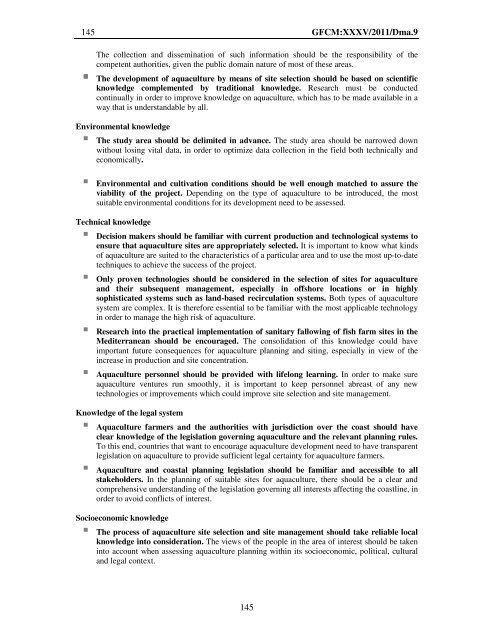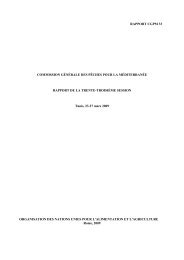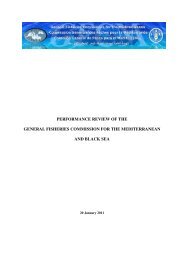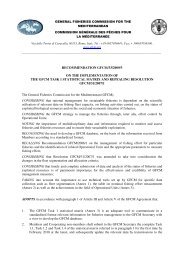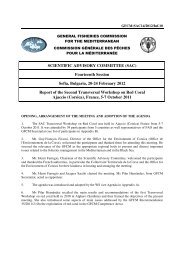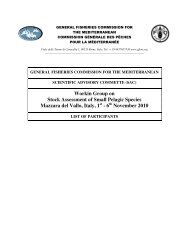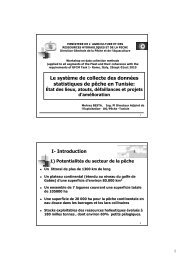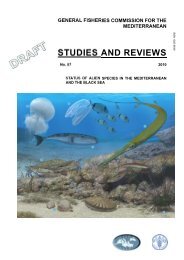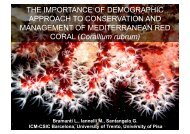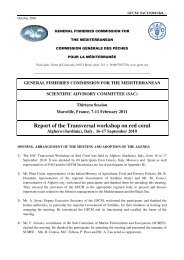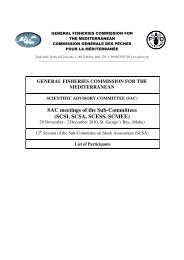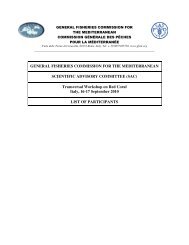Site selection and carrying capacity in Mediterranean ... - FAO Sipam
Site selection and carrying capacity in Mediterranean ... - FAO Sipam
Site selection and carrying capacity in Mediterranean ... - FAO Sipam
Create successful ePaper yourself
Turn your PDF publications into a flip-book with our unique Google optimized e-Paper software.
145 GFCM:XXXV/2011/Dma.9<br />
The collection <strong>and</strong> dissem<strong>in</strong>ation of such <strong>in</strong>formation should be the responsibility of the<br />
competent authorities, given the public doma<strong>in</strong> nature of most of these areas.<br />
The development of aquaculture by means of site <strong>selection</strong> should be based on scientific<br />
knowledge complemented by traditional knowledge. Research must be conducted<br />
cont<strong>in</strong>ually <strong>in</strong> order to improve knowledge on aquaculture, which has to be made available <strong>in</strong> a<br />
way that is underst<strong>and</strong>able by all.<br />
Environmental knowledge<br />
The study area should be delimited <strong>in</strong> advance. The study area should be narrowed down<br />
without los<strong>in</strong>g vital data, <strong>in</strong> order to optimize data collection <strong>in</strong> the field both technically <strong>and</strong><br />
economically.<br />
Environmental <strong>and</strong> cultivation conditions should be well enough matched to assure the<br />
viability of the project. Depend<strong>in</strong>g on the type of aquaculture to be <strong>in</strong>troduced, the most<br />
suitable environmental conditions for its development need to be assessed.<br />
Technical knowledge<br />
Decision makers should be familiar with current production <strong>and</strong> technological systems to<br />
ensure that aquaculture sites are appropriately selected. It is important to know what k<strong>in</strong>ds<br />
of aquaculture are suited to the characteristics of a particular area <strong>and</strong> to use the most up-to-date<br />
techniques to achieve the success of the project.<br />
Only proven technologies should be considered <strong>in</strong> the <strong>selection</strong> of sites for aquaculture<br />
<strong>and</strong> their subsequent management, especially <strong>in</strong> offshore locations or <strong>in</strong> highly<br />
sophisticated systems such as l<strong>and</strong>-based recirculation systems. Both types of aquaculture<br />
system are complex. It is therefore essential to be familiar with the most applicable technology<br />
<strong>in</strong> order to manage the high risk of aquaculture.<br />
Research <strong>in</strong>to the practical implementation of sanitary fallow<strong>in</strong>g of fish farm sites <strong>in</strong> the<br />
<strong>Mediterranean</strong> should be encouraged. The consolidation of this knowledge could have<br />
important future consequences for aquaculture plann<strong>in</strong>g <strong>and</strong> sit<strong>in</strong>g, especially <strong>in</strong> view of the<br />
<strong>in</strong>crease <strong>in</strong> production <strong>and</strong> site concentration.<br />
Aquaculture personnel should be provided with lifelong learn<strong>in</strong>g. In order to make sure<br />
aquaculture ventures run smoothly, it is important to keep personnel abreast of any new<br />
technologies or improvements which could improve site <strong>selection</strong> <strong>and</strong> site management.<br />
Knowledge of the legal system<br />
Aquaculture farmers <strong>and</strong> the authorities with jurisdiction over the coast should have<br />
clear knowledge of the legislation govern<strong>in</strong>g aquaculture <strong>and</strong> the relevant plann<strong>in</strong>g rules.<br />
To this end, countries that want to encourage aquaculture development need to have transparent<br />
legislation on aquaculture to provide sufficient legal certa<strong>in</strong>ty for aquaculture farmers.<br />
Aquaculture <strong>and</strong> coastal plann<strong>in</strong>g legislation should be familiar <strong>and</strong> accessible to all<br />
stakeholders. In the plann<strong>in</strong>g of suitable sites for aquaculture, there should be a clear <strong>and</strong><br />
comprehensive underst<strong>and</strong><strong>in</strong>g of the legislation govern<strong>in</strong>g all <strong>in</strong>terests affect<strong>in</strong>g the coastl<strong>in</strong>e, <strong>in</strong><br />
order to avoid conflicts of <strong>in</strong>terest.<br />
Socioeconomic knowledge<br />
The process of aquaculture site <strong>selection</strong> <strong>and</strong> site management should take reliable local<br />
knowledge <strong>in</strong>to consideration. The views of the people <strong>in</strong> the area of <strong>in</strong>terest should be taken<br />
<strong>in</strong>to account when assess<strong>in</strong>g aquaculture plann<strong>in</strong>g with<strong>in</strong> its socioeconomic, political, cultural<br />
<strong>and</strong> legal context.<br />
145


